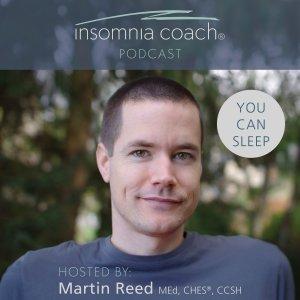Insomnia Coach® Podcast

How Rose battled with insomnia as a teenager but now looks forward to going to bed at night (#6)
Listen to the podcast episode (audio only) Rose started struggling with sleep at the age of just 12 years old. One bad night of sleep triggered a vicious cycle of ever-increasing sleep-related worry and anxiety, and ever-worsening sleep. At the age of 18, the added stress of exams led to panic attacks and as little as two to three hours of fragmented sleep each night. In this episode, Rose shares how she addressed her sleep issues so that she now feels far more energetic during the day, sees sleep in a far more positive light, and actually looks forward to sleep at night. Since recording this podcast episode, I'm happy to report that Rose did great on her A level exams, earning two As and a B. This means she formally received a job offer from the company she wanted to work for. Click here for a full transcript of this episode.Click here to hide the transcript. Martin Reed: Welcome to The Insomnia Coach Podcast. My name is Martin Reed. I believe that nobody needs to live with chronic insomnia and that cognitive behavioral therapy for insomnia (CBT-I) techniques can help you enjoy better sleep for the rest of your life. Martin Reed: All right. So thanks for being with us today, Rose. Rose Fullerton: Thank you very much for having me. Martin Reed: So can you tell us a little bit about when you started finding that sleep was becoming a problem for you? Rose Fullerton: Yeah, so I would pinpoint it back to about July, 2013. I was around 12. And up until then I absolutely loved residential sleepovers, all that kind of stuff. So I was away family friends. On the second last night, I just couldn't fall asleep for whatever reason. But it sort of manifested itself into this anxiety that when I went to bed I would never be able to fall asleep. And it's something that I've dealt with every single day up until about May of this year. When I would go to bed, I would just get so frustrated, I would be tossing and turning. I just would never be able to fully relax. Rose Fullerton: And then my exams hit, my A-level exams, which are for uni, and the stress just made everything explode in May and I was having panic attacks, I couldn't eat. It was just awful. And I was getting two to three hours of sleep per night, which were really light sleep and they were disturbed and interrupted and yeah, I had just tried to put it into a box and just not really deal with it. And I think that sort of came back to bite me this year when everything met head on. Martin Reed: Mm-hmm (affirmative). So you mentioned that you had a lot of worries going on, like when you got into bed. Were they specifically sleep-related worries right from the start or was it something else going on in your life that kept you awake and then it kind of turned into sleep related worries? Rose Fullerton: Yeah, I think that when I got into bed I just over-thought the entire sleep process and that sparked that anxiety. And then because my adrenaline would start to run, then I'd be like, oh my word, now I'm so much more awake, I'm never going to be able to fall asleep. And it just turned into this complete vicious cycle and I had the wrong mentality of, I refuse to get out of bed if I felt like that, even though, because I had so much adrenaline, I was buzzing, I was banging off the walls, I refused to get out of bed and I just had to stay there because I was like, if I got up out of bed, I'm going to wake up even more and I'm not going to be staying in the place where I will fall asleep. And it just, I think that, first of all, the fact I'm never going to be able to fall asleep then because I was never able to relax and then the thoughts of what was going to happen the next day, I didn't get a good night's sleep.






 Visit Podcast Website
Visit Podcast Website RSS Podcast Feed
RSS Podcast Feed Subscribe
Subscribe
 Add to MyCast
Add to MyCast